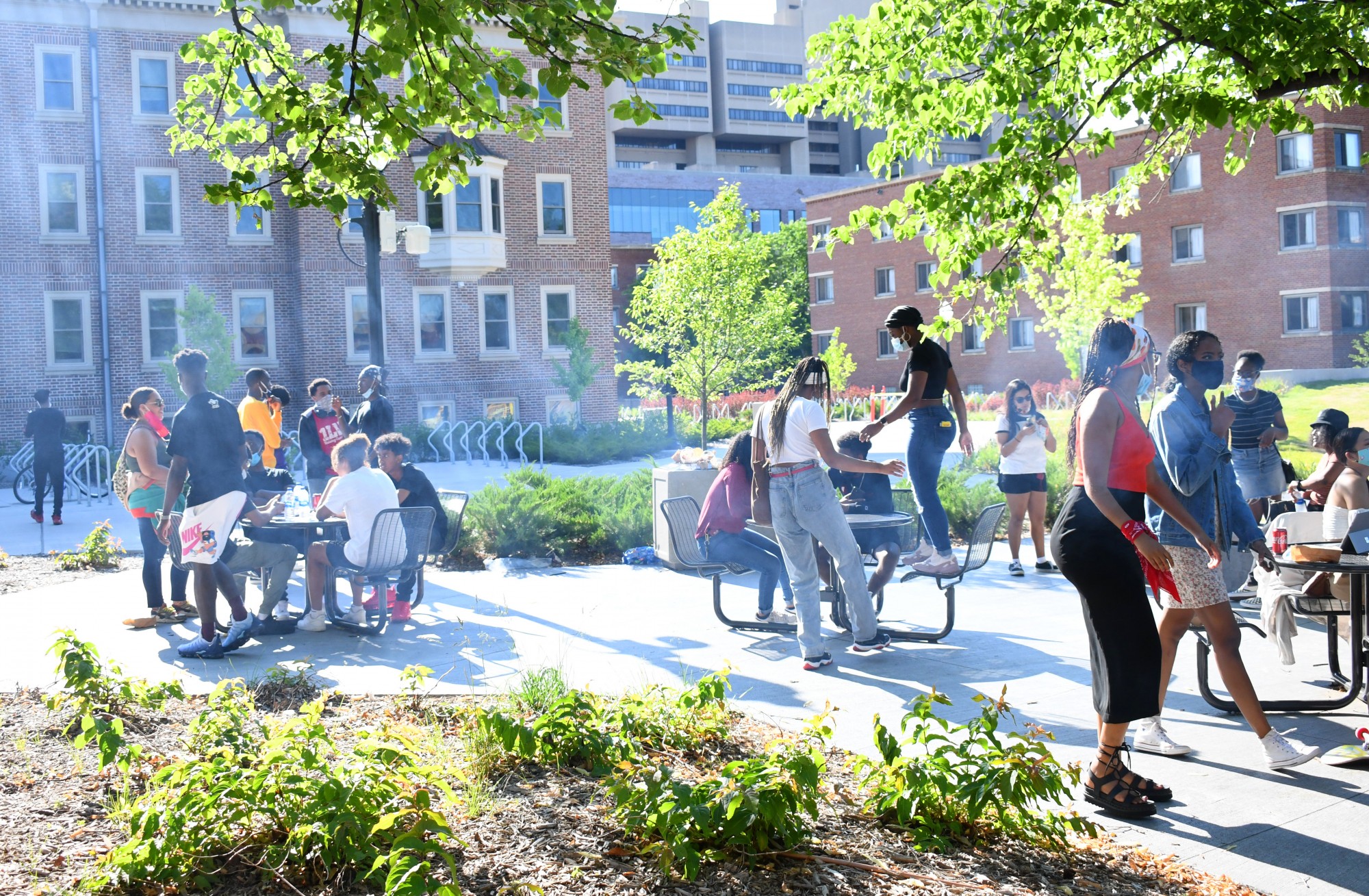For Lina Abdirahman, it was good to see many of her friends again after weeks of protests and even longer weeks of social distancing.
Abdirahman, the president of the Black Student Union, was joined by over 60 other people, a majority of whom wore masks, for a Juneteenth barbecue outside of Centennial Hall. The Saturday event commemorated June 19, 1865, when enslaved people in Texas learned that they were free — two years after emancipation.
BSU and several other student organizations, including the Somali Student Association, the National Association of Black Accountants and First Generation College Students, hosted the celebration.
The barbecue was pushed back a day because BSU members were involved with larger Juneteenth events in Minneapolis on Friday, according to board members. But the student group wanted to host a commemoration of their own, and Saturday marked BSU’s first Juneteenth celebration, according to Abdirahman.
“I think everyone is kind of on their last straw. Everybody’s fighting back with everything going on, you know, trying to abolish the police, trying to fight back against the system,” she said, referring to the work students have been doing to protest police brutality following the police killing of George Floyd on May 25.
“So this [is] kind of everybody’s break, time to recuperate some positive energy and then go back to fighting.”

Students grilled on the dorm lawn with a live DJ in the background, and people gathered around when it came time for games, like the dance-off and fill-in-the-lyrics challenge. The music stopped when University student Camille Winston took the mic.
Winston shared the story of how her family members from several generations ago were finally set free from a plantation. She said her ancestors loaded everything they owned and their five kids into a wagon and headed to New York to begin a new life of freedom.
“I think about the dreams my ancestors had and how I’m now living that dream. I thank them for their perseverance and strength and their determination to make it in this free America,” Winston said in the speech.
“Not only does modern Juneteenth represent freedom, achievements, community, but hope for the future. I hope for real change, hope that my children will not experience the discrimination both I and my ancestors have faced.”
Many students there were also observing Juneteenth for the first time.
First-year student Johnny Egbuson, who grew up in Uganda, recalled his aunts and uncles telling him about how they would have cookouts and parties in America for the holiday. Egbuson said he and some friends spent Friday drinking root beer floats on the Stone Arch Bridge.
“It’s probably the first time during Juneteenth I’d actually been in America. And I thought I might as well get the experience because I know it’s an important holiday,” Egbuson said.
Nathanael Ashton-Piper, a fourth-year student, watched a dance battle as he waited for food. Earlier in the month, Ashton said he was feeling overwhelmed watching the escalating protests on social media while he was out of the city.
“It’s just, like, continuous. I mean, I had to delete social media off my phone just so I wouldn’t look at it,” he said. “And just thinking about the scope of the problems just makes your head hurt.”
But Ashton said he was doing better and being at the event helped.

With people typically dispersed from campus and new board leadership, BSU usually does not host summer events. But, after this month, BSU’s vice president Gbemi Oyetunde said board members felt like they had to come back together and support the community.
The group organized a cleanup of the area around the Third Precinct, where buildings had been damaged by rioting, and helped fundraise about $10,000 to donate food, first aid and other necessities to residents hard-hit by recent events, according to Oyetunde.
“I just hope [students] know that no matter what happens, the community that they have will always have their back,” Oyetunde said, adding that the event may serve as an introduction for first-year students to the organization in the future.
Though people may have known about Juneteenth in the past, fourth-year student Georgina Simon said this time more people are “no longer allowing themselves to be ignorant.”
Simon said, “It’s significant because now people are actually opening their eyes and taking the initiative to be like, ‘Okay, [the system] has never been for us, and it never will be for us.’ So we’re gonna take what’s ours, and we’re gonna make some noise with it.”
Jasmine Snow contributed to this report.








